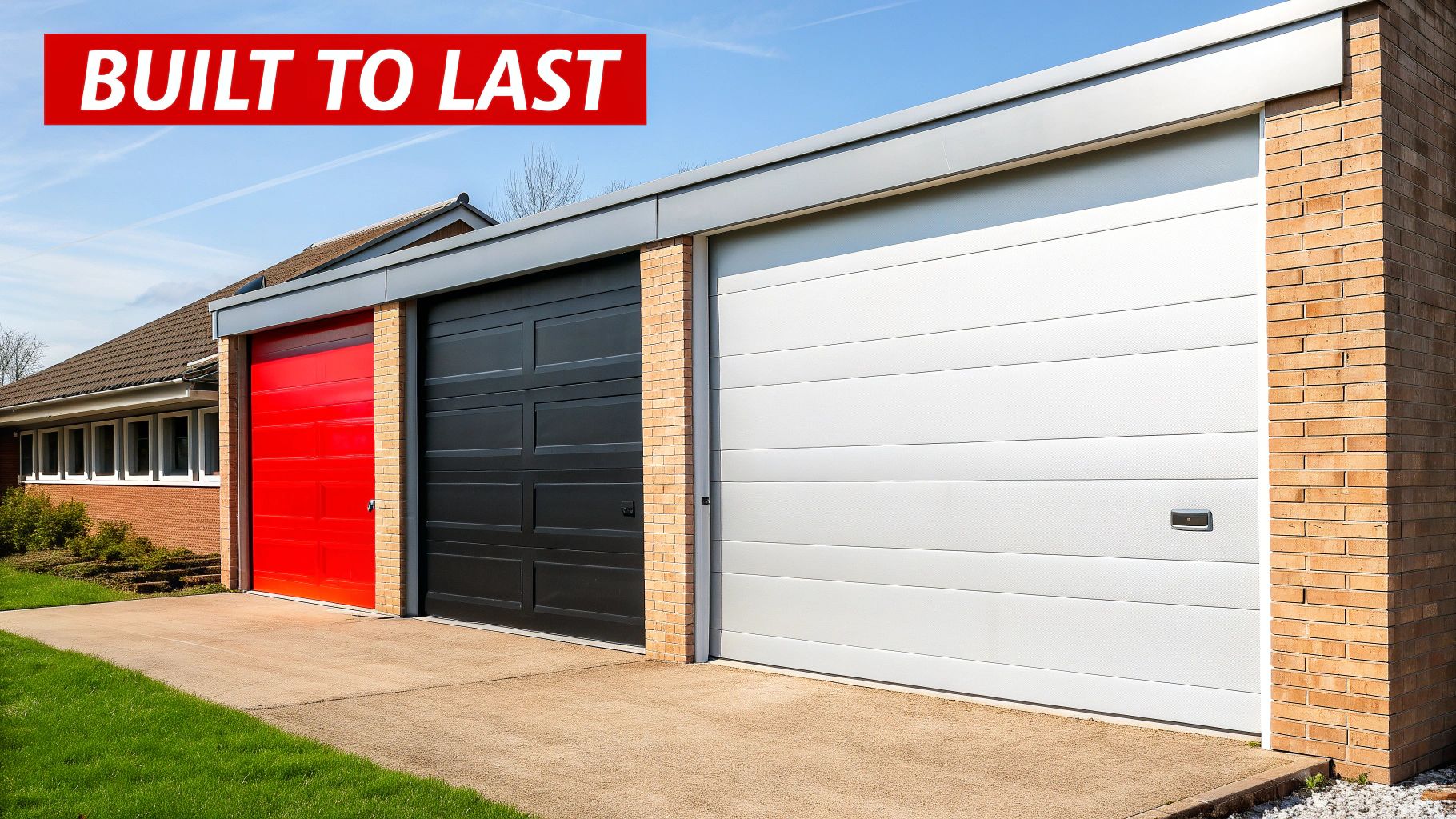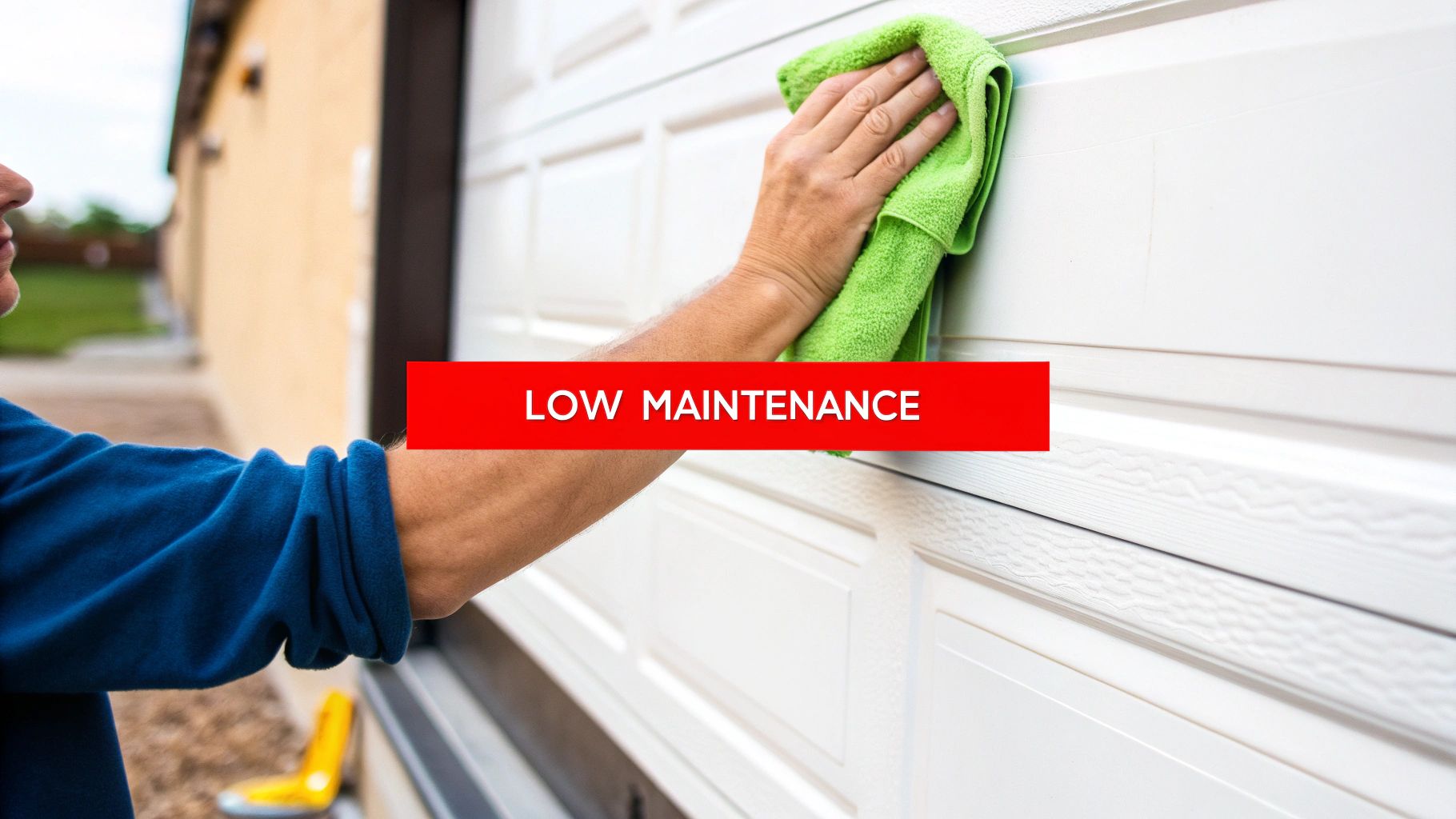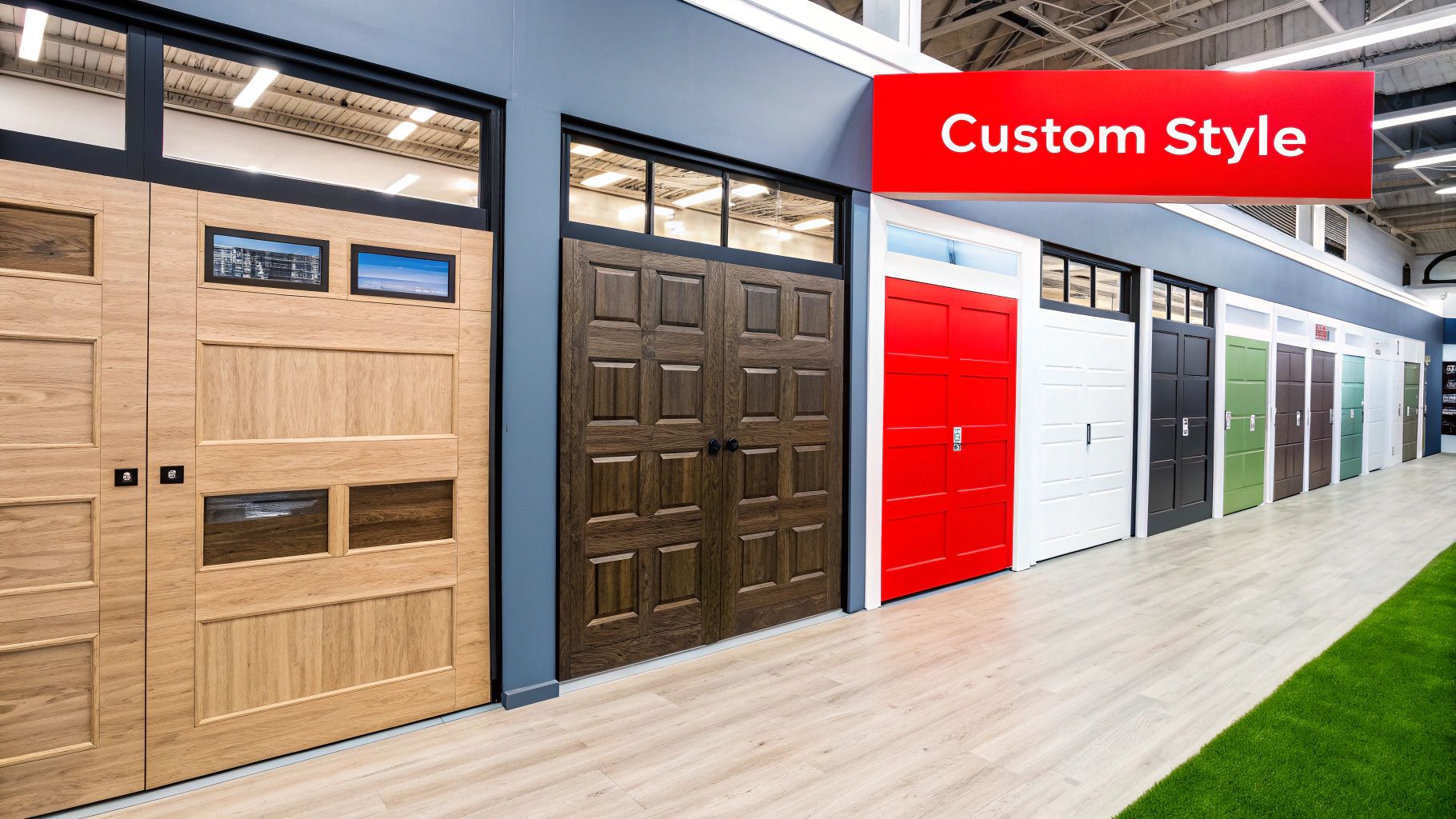When you're deciding between a steel or an aluminum garage door, the right answer depends on your specific priorities. For the majority of homeowners and businesses we work with in Texas and Oklahoma, steel is the hands-down winner for its raw strength and security. According to 2024 market analysis, steel doors command a dominant 58.3% of North American sales, underscoring their popularity. That said, aluminum is the superior choice if you're after a sleek, modern look with full-view glass or if you're in a high-humidity area where corrosion resistance is your top priority.
Comparing Steel and Aluminum Garage Doors
Picking the right material for your garage door is a critical decision. It impacts everything—your property's security, its curb appeal, and even your energy bills for years to come. It’s a lot like choosing the right roofing material; if you want to see how material choices play out in another industry, this a complete guide comparing three-tab vs. dimensional shingles offers a similar breakdown of cost, durability, and aesthetics.
When it comes to residential and commercial garage doors, steel and aluminum are the two leading choices. Each has its own set of pros and cons that make it better suited for the diverse climates and architectural styles we see across Texas and Oklahoma.
Steel vs. Aluminum Garage Doors: At a Glance
To get started, let's lay out the main differences. Think of this table as a quick reference guide to help frame your thinking before we dive into the specific data and practical applications.
| Feature | Steel Garage Doors | Aluminum Garage Doors |
|---|---|---|
| Durability | Excellent: Highly resistant to dents and impacts. Lower gauge steel (e.g., 24-gauge) offers superior strength. | Good: More prone to denting but is 100% rust-proof, ideal for humid or coastal climates. |
| Cost | More Affordable: Generally a lower upfront investment for standard models. | More Expensive: Typically comes with a higher price tag, especially for full-view glass designs. |
| Weight | Heavy: Requires a robust opener system but provides a more secure barrier. | Lightweight: Puts less strain on openers, springs, and tracks. |
| Insulation (R-Value) | Superior: Multi-layer construction offers excellent R-values (often R-12 to R-18+) for better climate control. | Limited: Standard models offer poor insulation, though thermally broken frames are available. |
| Maintenance | Low: Requires periodic checks for scratches to prevent rust. | Very Low: No rust concerns; main focus is preventing and managing dents. |
| Typical Lifespan | 30+ Years: With proper maintenance. | 20-25 Years: Offers a long, corrosion-free service life. |
This quick overview gives you a solid starting point. As you can see, steel often delivers a fantastic blend of performance, longevity, and value for properties in Texas and Oklahoma.
Now, let's dig deeper into these differences to help you find the perfect match for your home or commercial building.
Analyzing Durability and Structural Strength
Here in Texas and Oklahoma, we're no strangers to severe weather. From intense hailstorms to high winds, the durability of your garage door isn’t just a feature; it’s a critical component of your property's defense. When comparing steel versus aluminum, structural strength is a key differentiator that impacts security, safety, and long-term costs.

Steel: The Heavy-Duty Defender
When it comes to sheer impact resistance, steel is the undisputed champion. Its dense, rigid nature means it can withstand everyday mishaps—a stray baseball, a bumped lawnmower, or a hailstorm—that would leave a serious dent in a softer material.
The key to a steel door's toughness is its gauge, a measure of its thickness. It's a bit counterintuitive, but a lower gauge number means thicker, stronger steel.
- 24-Gauge Steel: This is your premium, heavy-duty option. It’s a top choice for commercial buildings or any homeowner who prioritizes maximum durability and security.
- 27 or 28-Gauge Steel: Found in more budget-friendly residential doors, this thinner steel still performs well but is more susceptible to denting than its lower-gauge counterparts.
Actionable Tip: For most Texas and Oklahoma properties, a 24 or 25-gauge steel door provides the ideal balance of strength and value. If you're in an area prone to high winds or hail, investing in a lower-gauge door is a wise long-term decision.
Industry Standard: For high-wind areas, a wind-load-rated steel door is non-negotiable. These doors are engineered with additional bracing and heavy-duty hardware to meet specific building codes (like those in coastal Texas) and resist buckling under intense pressure.
Aluminum: The Corrosion-Proof Contender
While steel wins on raw strength, aluminum’s superpower is its natural resistance to rust and corrosion. Aluminum simply does not rust, making it an excellent choice for highly humid environments where constant moisture can compromise other metals.
However, this lightweight advantage comes with a significant trade-off: aluminum dents far more easily than steel. For an active family home or a high-traffic commercial garage, this can be a major drawback. A minor bump that a steel door would shrug off could leave a permanent, unsightly dent in an aluminum one.
This clear difference in durability is a big reason why steel dominates the market. In fact, North America accounts for a massive 36% of the global market revenue for garage doors in 2024, largely due to stringent building codes and a strong consumer preference for durable, long-lasting products.
Of course, the material itself is just one piece of the puzzle. Understanding general door security features is crucial for a complete security solution. For superior protection against both physical impacts and potential intruders, steel is almost always the top recommendation.
Upfront Cost vs. Long-Term Value: A Financial Breakdown
Let's talk money. The initial price tag is just the start. The true cost of a garage door is its total cost of ownership, factoring in the initial purchase, potential repairs, energy savings, and its impact on your property's resale value.
When weighing steel against aluminum, it's crucial to look beyond the sticker price to make a smart financial decision for your home or business.

Analyzing the Initial Investment
Right out of the gate, a standard, non-insulated steel garage door is almost always the more budget-friendly option. For a typical home in Texas or Oklahoma, a basic steel door will have a lower upfront cost than a comparable aluminum model.
However, several factors can influence the price:
- Insulation: Adding high-quality polyurethane insulation to a steel door (which we highly recommend for energy efficiency) will increase the cost but pay for itself in energy savings.
- Finishes: A premium wood-grain finish or a custom color on a steel door also adds to the initial cost.
- Construction: Aluminum doors, particularly the sleek, full-view glass models popular in modern architecture, start at a much higher price point due to material costs and more complex engineering.
Factoring in Long-Term Value and Repair Costs
This is where steel’s durability often translates into long-term savings. Its superior dent resistance means you’re less likely to need service calls for cosmetic or functional damage after a hailstorm or minor impact.
Real-World Application: A steel door’s real financial advantage isn’t just its lower initial price—it’s the money you don’t spend on repairs. Fixing a single significant dent on a lightweight aluminum door could easily erase any upfront savings.
On the other hand, aluminum’s key long-term benefit is that it will never rust. In humid climates, a steel door that isn't meticulously maintained can eventually corrode, potentially requiring a full replacement. That's a major expense an aluminum door owner will never face.
The costs for professional garage door installation are generally similar for both materials. The decision comes down to which material's strengths offer the best protection against future expenses for your specific location and usage. For most property owners in our region, steel's robustness provides the most reliable long-term investment.
Evaluating Energy Efficiency and Insulation
In Texas and Oklahoma, where we experience scorching summers and unexpected cold snaps, your garage door plays a major role in your property's energy efficiency. An uninsulated door is essentially a giant thermal hole in your wall, allowing outdoor temperatures to infiltrate your garage and, subsequently, your home or business. This forces your HVAC system to work harder, driving up your utility bills.
The key metric here is the R-value, which measures a material's resistance to heat flow. A higher R-value means better insulation—and greater energy savings.
Steel Doors: The Insulation Powerhouse
For thermal performance, steel is the superior choice. While steel itself is a conductor, modern steel garage doors are engineered with a multi-layer "sandwich" construction that traps an insulating core between steel panels, creating a highly effective thermal barrier.
This performance advantage is a key reason the steel segment of the global garage door market accounted for over 42% market share in 2023. These doors typically feature two steel layers sandwiching an insulating core, a design that boosts both energy efficiency and structural rigidity. For a deeper look at these market trends, you can explore the full report on garage and overhead doors.
The type of insulation core makes a big difference:
- Polystyrene Insulation: A rigid foam board fitted between the steel panels. It offers good R-values (typically R-6 to R-9) and adds rigidity to the door.
- Polyurethane Insulation: A premium foam injected between the steel layers, where it expands to fill every gap. This creates a denser, more complete barrier with a significantly higher R-value (often R-12 to R-18+).
Actionable Tip: For any Texas or Oklahoma property, an insulated steel door with an R-value of R-12 or higher is one of the smartest upgrades you can make. It helps keep your garage cooler in the summer and warmer in the winter, stabilizing the temperature of adjacent living or working spaces.
Aluminum Doors: Modern Looks with Thermal Options
On its own, aluminum does not insulate as well as a layered steel door. However, modern aluminum doors, especially full-view glass models, can be engineered for better thermal performance.
Manufacturers now offer thermally broken frames that reduce heat transfer and glazing options like double-paned or insulated glass. While you likely won't achieve the high R-values of a premium polyurethane-insulated steel door, these features make aluminum a viable choice if you desire a contemporary style without completely sacrificing energy efficiency.
Exploring Design Versatility and Curb Appeal
Your garage door is a dominant feature of your property's exterior, often accounting for up to 40% of its facade. Its style has a significant impact on curb appeal and even market value. The choice between steel and aluminum isn't about which is "better," but which material best complements your property's architecture and your personal aesthetic.

A sleek, modern commercial building in Denison will demand a different look than a traditional brick home in Lawton, and the right door material makes all the difference.
Steel: The Style Chameleon
For sheer design variety, steel is unmatched. Modern manufacturing allows steel panels to be stamped, embossed, and finished to replicate an incredible range of styles, making it adaptable to the diverse architecture across Texas and Oklahoma.
- Classic Raised Panels: A timeless look that complements traditional home designs.
- Carriage House Style: Captures rustic, old-world charm with the convenience of a modern overhead door.
- Faux Wood Finishes: Provides the warm, inviting look of real wood without the demanding maintenance, mimicking the grain of oak, cherry, or walnut with stunning realism.
This flexibility means you can almost always find a steel door that feels custom-made for your property, whether it's a sprawling ranch house or a commercial storefront.
Real-World Application: The beauty of steel is its dual nature—it’s both a workhorse and a showpiece. You get a tough, secure, high-R-value door that can also perfectly capture the aesthetic of a high-end wood door.
Aluminum: The Modern Minimalist
Aluminum is the undisputed champion of modern and contemporary design. Its unique combination of being lightweight yet strong makes it the ideal material for full-view garage doors, which feature expansive glass panels set in clean, narrow frames.
These doors are perfect for blending indoor and outdoor spaces, allowing natural light to flood the garage and transform it into a bright, functional area. This style is also a favorite for commercial applications like restaurants with patio access, fire stations, or auto service centers where visibility and an open feel are essential.
Explore our gallery of residential garage doors and accessories to see how these materials look in real-world applications. Steel offers timeless versatility, while aluminum delivers a clean, bold, and modern aesthetic.
Understanding Maintenance and Lifespan
A new garage door is a long-term investment. Understanding the maintenance requirements and expected lifespan of steel versus aluminum is crucial for making a choice that will serve you well for decades, especially given the harsh weather conditions in Texas and Oklahoma.
Industry data from 2024 shows that the global garage door market is projected to reach $9.94 billion by 2029, driven by consumer demand for durable, low-maintenance, and aesthetically pleasing options. You can discover more insights about these market trends on fortunebusinessinsights.com.
Steel Door Maintenance and Longevity
The primary vulnerability of steel is rust. While modern steel doors are protected with galvanized coatings and durable factory finishes, a deep scratch or gouge can compromise this protective layer. Once raw steel is exposed to moisture, corrosion can begin.
Actionable Tip: After a hailstorm or any impact, conduct a quick visual inspection of your steel door.
- Routine Cleaning: Wash the door twice a year with mild soap and water to remove dirt and grime that can degrade the finish.
- Scratch Repair: Address any scratches immediately with manufacturer-approved touch-up paint. This is your best defense against rust.
- Expected Lifespan: With simple, consistent care, a quality steel garage door can easily last 30 years or more, providing an excellent return on investment.
The most common mistake we see is ignoring small scratches. What appears to be a minor cosmetic issue can quickly become a significant rust problem, especially during a humid Texas summer.
Aluminum Door Maintenance and Longevity
Aluminum's greatest maintenance advantage is its natural immunity to rust and corrosion. This makes its upkeep incredibly straightforward.
The trade-off is its softness. Aluminum is more susceptible to denting from impacts. While minor dings are typically cosmetic, a significant impact could affect the door's operation, and repairing dents in an aluminum panel is often difficult without replacing the entire section.
- Primary Task: The main job is simply cleaning the door to maintain its appearance.
- Dent Prevention: Be mindful of activities around the garage. Preventing impacts is the best way to protect an aluminum door.
- Expected Lifespan: An aluminum door can serve you well for 20 to 25 years, offering a long, corrosion-free life.
Regardless of the material, proactive care is key. To protect your warranty, ensure safe operation, and maximize longevity, scheduling a professional garage door maintenance check is the most effective strategy.
Frequently Asked Questions
When choosing between steel and aluminum garage doors, especially for properties in Texas and Oklahoma, several key questions consistently arise. Clear answers can help you make a confident, well-informed decision.
Which Garage Door Is Better for High-Wind Areas?
For withstanding high winds, steel garage doors are unequivocally superior. Their inherent strength and greater weight provide a significant advantage against the wind pressure common in storm-prone areas across Texas and Oklahoma.
Actionable Tip: If your property is in a high-wind zone, look for a steel door with a specific wind-load rating. These doors are engineered with reinforced steel struts, heavy-duty hardware, and upgraded track systems designed to meet stringent local building codes and protect your property during severe weather.
Can an Aluminum Garage Door Be Painted?
Yes, you can paint an aluminum garage door, but proper preparation is critical for a durable finish.
You cannot simply apply a coat of paint. The correct process involves thoroughly cleaning the surface, scuff-sanding to create a profile for adhesion, applying a high-quality acrylic latex primer formulated for metal, and finishing with a top coat of 100% acrylic latex paint.
A common mistake is skipping the sanding and priming steps. Without proper surface preparation, even the best paint will peel and fail quickly, especially under the intense Texas sun.
Which Material Offers Better Security?
If security is a primary concern, steel offers a significantly higher level of protection. As a denser, more rigid material, it is far more resistant to forced entry than the lighter, more pliable aluminum.
For maximum security, an insulated, multi-layer steel door is the ideal choice. It creates a formidable physical barrier against intrusion. While a high-quality lock is essential, the sheer strength of the door itself, compliant with standards like UL 325 for safety, serves as your first and most important line of defense.
Ready to find the perfect garage door for your home or business? The expert technicians at Overhead Door Co. of Tex-Oma are here to help you weigh your options and provide a professional, seamless installation. Get in touch with our team today.
